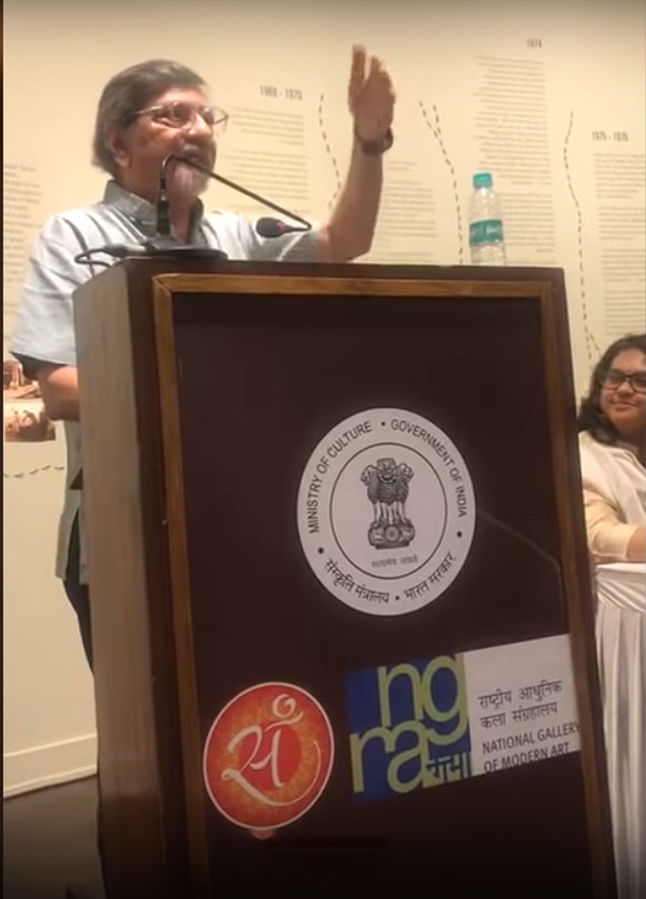
Amol Palekar is known for playing meek characters in his movies but the actor didn’t hold back when it came to placing on record his disapproval of some steps taken by the Ministry of Culture.
He was repeatedly interrupted and cut off while on the dais at an event at the National Gallery of Modern Art, Mumbai.
The video clip went viral and many were outraged at the disrespect shown to a stalwart of the Hindi and Marathi film industry.
Metrolife spoke to some Bengalureans to understand their sentiments.
K M Chaitanya
Film and theatre director, documentary maker
“Art and institutions of art and culture have always been free spaces, free to voice dissent against the establishment. In India, successive political regimes have tried to regulate or stifle them, but eventually, artists have emerged with their freedom intact. Before democracy, when kings and queens gave royal patronage to the arts, they expected artists to bow to them and do their bidding. In a democracy, these artists and institutions get patronage from the people and their taxes, not from political masters. Political powers need to understand that and let artists be free. Stifling art and its institutions is a sure sign that democracy itself is in danger. The Amol Palekar incident is, therefore, serious and everyone has to take note.”
Archana Prasad
Founder of Jaaga.in, a community space for the arts in Shantinagar
“Museums, art galleries, and art spaces ideally should be accessible to all and be spaces that host and protect openness and our right as creators and the public to freedom of expression. I strongly believe the best state-run arts and culture organisations, spaces and institutions support diversity of representation within their administration, and a close and direct connection to the creative communities they represent and support.”
She also addresses the core issue that caused Amol Palekar to voice his anguish—a talk that all artistes’ advisory committees at NGMA’s Mumbai and Bengaluru centres were being abolished.
“Public access to the arts is very important. Art opens up possibilities of dialogue, shows nuances, and is the flagstaff of a people’s culture. Thus, I feel that public funds should support contemporary arts practice and be mediated and disbursed by a body that includes representatives from both the government and the field of arts,” she says.
Saad Khan
Director and screenwriter
“It could have been done differently. When the person on the dais is such an established actor, then his stature should have been taken into consideration. If the organisers had a problem with what he was saying, they could have shared their concerns with him later, after the event. They should not have tried to stop him from talking or interrupted him in front of the entire audience. Respect should have been maintained. But it would also be twisting the incident to say that freedom of expression was being attacked there. It would be unfair to say that we are absolutely intolerant. I have done shows and movies making fun of politicians and the government and till date, I have not had people come up to me and say that what I said was wrong. So I don’t think we are intolerant as a whole.”
Gowri Om
Co-founder, BRC Audio Newscast
As practitioners of democracy we haven’t been able to stomach respectful dissent and we still have no idea what sense to make of it because it directly feeds off party politics. It seems Indian political history has stopped the recognition of dissenting voices after the formation of the republic, like it had no need for it after.
Amol Palekar’s argument seems fair in that NGMA should have given him an agenda to address, in the absence of which he represents himself. The scrapping of the advisory committees in Bangalore and Mumbai is an important conversation in today’s climate. So I don’t actually see how it is not connected.
It is important to ask the question at the memorial function of a modernist painter like Prabhakar Barwe why the government is interested in promoting its own archives and limiting the space available to encourage the entry of new work. One would argue that the Ministry of Culture is restricting the space available for the showcase of present-day art and that is a denial of freedom.
What happened in Mumbai
Amol Palekar was invited to speak at the opening of an exhibition called ‘Inside The Empty Box’ in memory of artist Prabhakar Barwe at the National Gallery of Modern Art in Mumbai.
In his speech (videos of which are doing the rounds on the Internet), the actor raised his concerns about how the Ministry of Culture had abolished all artistes’ advisory committees at the gallery’s Mumbai and Bengaluru centers.
He was quoted as saying, “Many of you may not know that this retrospective will be the last show decided by the advisory committee of local artists and not by some bureaucrat or an agent of the government with an agenda of either moral policing or proliferation of certain art commensurate with an ideological incline.”
Before he could complete, a gallery member on the stage interrupted him and told him to focus on the event and the artist Barwe.
However, he continues talking about how the decisions on whose work should be exhibited will now come directly from Delhi from the Ministry of Culture. At this stage, another female official of the gallery interrupted him.
Govt take
The Centre’s Ministry of Culture issued a clarification saying the National Gallery of advisory committees have not been dissolved.
A statement says: “The advisory committees of NGMA Mumbai, Bengaluru and Delhi have not been dissolved. Their terms have ended recently (Mumbai and Bengaluru committee terms ended on November 15, 2018, and of Delhi on January 17, 2019). The committees are in the process of being reconstituted.”
Metrolife called the gallery in Bengaluru twice on Tuesday. The person concerned could not be reached for comment. The gallery said they would call back, but didn’t.